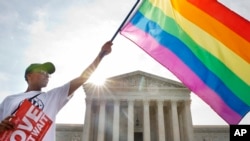This past June, the United States Supreme Court legalized same-sex marriage nationwide. The decision was controversial. Many Americans did not support the ruling because of their religious beliefs. Thus, the act of legalizing same-sex marriage represents a constitutional commitment to equality and freedom — including freedom of religion.
Religious freedom is one of the United States' foundational values. A critical part of U.S. constitutional rights is the separation of church and state. The government, according to the first amendment, cannot establish or provide financial support to any religious institution or belief:
“Congress shall make no law respecting an establishment of religion, or prohibiting the free exercise thereof; or abridging the freedom of speech, or of the press; or the right of the people peaceably to assemble, and to petition the government for a redress of grievances”.
Throughout its history, the United States has allowed people to worship in whatever manner they see fit. Thus, many religions have started here, such as the Mormon Church, Scientology, Jehovah’s Witnesses, and many more.
Elaine Howard Ecklund, a professor of sociology at Rice University, said that religious tolerance is a complex matter and not everyone has the same thought on what it means.
“Some think it means that everyone agrees with everyone else," she said. "But scholarship shows us that there are very real inter-religious differences and that the best models of tolerance allow people to fully embrace their own faith traditions while learning to live well and in peace with those with whom they disagree.”
Moreover, Ecklund said that while religious freedom is a basic tenet of American society, not all religions are viewed by all Americans the same way.
“Religious pluralism and religious freedom are part of the demographic structure of the U.S. and core American values – even a part of our legal system," she said. "However, cultural attitudes towards people of faiths that are outside the Judeo-Christian traditions are yet another thing.”
Religious freedom enshrined in Kosovo constitution
In Kosovo, one of the newest countries in the world, is also taking steps to make sure harmony and religion diversity is part of its culture. The Constitution of the Republic of Kosovo also provides the right for all the citizens to freely practice religion.
“Freedom of belief, conscience and religion includes the right to accept and manifest religion, the right to express personal beliefs and the right to accept or refuse membership in the religious community or group."
In Ferizaj, Kosovo, the city’s mosque and church sit next to each other, representing an example of religious harmony that is often found in Kosovo.
The Republic of Kosovo is one of only a small handful of countries to be graded "free and equal" by the International Humanist and Ethical Union in its annual Freedom of Thought report.
There are, of course, examples in both the U.S. and Kosovo of occasions when the ideals of religious freedom and tolerance expressed in their constitutions are not reflected by the actions of some individuals or groups.
The United States and Kosovo have vastly different histories, cultures, and morals. Yet they share the same ideals on religious tolerance – a principal that is key to building and sustaining a great – and free – nation.





